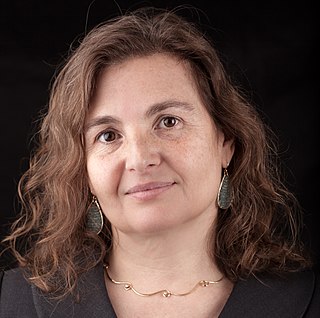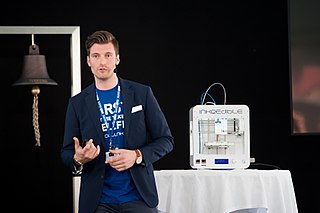Related Research Articles

In medicine, a prosthesis, or a prosthetic implant, is an artificial device that replaces a missing body part, which may be lost through trauma, disease, or a condition present at birth. Prostheses are intended to restore the normal functions of the missing body part. Amputee rehabilitation is primarily coordinated by a physiatrist as part of an inter-disciplinary team consisting of physiatrists, prosthetists, nurses, physical therapists, and occupational therapists. Prostheses can be created by hand or with computer-aided design (CAD), a software interface that helps creators design and analyze the creation with computer-generated 2-D and 3-D graphics as well as analysis and optimization tools.

The University of the West of England is a public research university, located in and around Bristol, England, UK. With more than 36,000 students and 4,200 staff, it is the largest provider of higher education in the South West of England.

Cynthia Breazeal is an American robotics scientist and entrepreneur. She is a former chief scientist and chief experience officer of Jibo, a company she co-founded in 2012 that developed personal assistant robots. Currently, she is a professor of media arts and sciences at MIT and the director of the Personal Robots group at the Media Lab. Her most recent work has focused on the theme of living everyday life in the presence of AI, and gradually gaining insight into the long-term impacts of social robots.
Bio-mechatronics is an applied interdisciplinary science that aims to integrate biology and mechatronics. It also encompasses the fields of robotics and neuroscience. Biomechatronic devices cover a wide range of applications, from developing prosthetic limbs to engineering solutions concerning respiration, vision, and the cardiovascular system.
Ottobock SE & Co. KGaA, formerly Otto Bock, is a company based in Duderstadt Germany, that operates in the field of orthopedic technology. It is considered the world market leader in the field of prosthetics and one of the leading suppliers in orthotics, wheelchairs and exoskeletons.

Daniela L. Rus is a roboticist and computer scientist, Director of the MIT Computer Science and Artificial Intelligence Laboratory (CSAIL), and the Andrew and Erna Viterbi Professor in the Department of Electrical Engineering and Computer Science (EECS) at the Massachusetts Institute of Technology.
Corinna E. Lathan is an American entrepreneur, engineer, and social activist. She is the Chief Executive Officer, Co-Founder, and Board Chair of AnthroTronix, Inc., a biomedical research and development company headquartered in Silver Spring, Maryland, USA. Lathan is recognized for her work on digital health software and assistive technology.

Krisztina Holly, known by her colleagues as 'Z', is a Hungarian American innovator, entrepreneur, and adventurer.

Protolabs is a company that provides rapid manufacturing of low-volume 3D printed, CNC-machined, sheet metal, and injection-molded custom parts for prototyping and short-run production. Markets like medical devices, electronics, appliances, automotive and consumer products use these parts. Protolabs' headquarters and manufacturing facilities are located in Maple Plain, Minnesota. The company also has manufacturing facilities in England, Germany, and Japan.
Sheila Nirenberg is an American neuroscientist and professor at Weill Cornell Medical College. She works in the field of neural coding, developing new kinds of prosthetic devices that can communicate directly with the brain, and new kinds of smart robots. She is a recipient of a MacArthur “genius” award and has been the subject of, or featured in, several documentaries for her technology for treating blindness.
Ryan Bethencourt is an American scientist, entrepreneur, and biohacker best known for his work as co-founder and CEO of Wild Earth, Partner at Babel Ventures and cofounder and former Program Director at IndieBio, a biology accelerator and early stage seed fund. Bethencourt was head of life sciences at the XPRIZE foundation, a co-founder and CEO of Berkeley Biolabs, a biotech accelerator, and Halpin Neurosciences, an ALS therapeutics-focused biotech company. Bethencourt co-founded Counter Culture Labs, a citizen science nonprofit, and Sudo Room, a hacker space based in downtown Oakland, California.

Open Bionics is a UK-based company that develops low-cost, 3D printed bionic arms for amputees with below elbow amputations. Their bionic arms are fully functional with lights, bio feedback vibrations and different functions that allow the user to grab, pinch, high-five, fist bump and thumbs-up. The company is based inside Future Space, co-located with Bristol Robotics Laboratory. The company was founded in 2014 by Joel Gibbard MBE and Samantha Payne MBE.
Mahiben Maruthappu is a British physician, entrepreneur, academic researcher and health policy specialist. He co-founded Cera, a home healthcare company and one of the largest social care providers in the UK. He was the founder and first President of the United Kingdom Medical Students' Association (UKMSA). He co-founded the National Health Service (NHS) Innovation Accelerator (NIA), a program that accelerates the adoption of new healthcare technologies, and served as NHS England's Innovation Adviser. He has contributed to more than 60 research papers in peer-reviewed journals.
Ashutosh Saxena is an Indian-American computer scientist, researcher, and entrepreneur known for his contributions to the field of artificial intelligence and robotics. His research interests include deep learning, robotics, and 3-dimensional computer vision. Saxena is the co-founder and CEO of Caspar.AI, which is an artificial intelligence company that automates peoples' homes and builds applications such as fall detectors for senior living. Prior to Caspar.AI, Ashutosh co-founded Cognical Katapult, which provides a no credit required alternative to traditional financing for online and omni-channel retail. Before Katapult, Saxena was an assistant professor in the Computer Science Department and faculty director of the RoboBrain Project at Cornell University.

David Moinina Sengeh is a Sierra Leonean politician who has served as the chief minister of Sierra Leone after being appointed by President Julius Maada Bio in 2023. He previously served as the minister of basic and senior secondary education and chief innovation officer for the Directorate of Science, Technology and Innovation. He is a TED Senior Fellow.

Erik Gatenholm is a Swedish-American entrepreneur. He is credited with marketing the world's first universal bio-ink.
Jenny Griffiths is the founder and CEO of Snap Vision. She is a software engineer turned entrepreneur.

BETIC based at Indian Institute of Technology Bombay is an inter-disciplinary multi-institution initiative for medical device innovation. Established in 2014 with support from the government of Maharashtra, it comprises a network of 14 engineering and medical institutes across the state. The BETIC team have developed 50 medical devices as of 2019, and licensed 20 of them to startup companies or industry for mass production.
FarmWise Labs, Inc. is an American agricultural technology and robotics company, based in California. Its first product is an automated mechanical weeder that uses a combination of AI, computer vision and robotics to pull out weeds in vegetable fields without using chemicals. It won several industry innovation awards related to agriculture and sustainability.

Aadeel Akhtar is a neuroscientist and electrical engineer. He is CEO and founder of the bionics company PSYONIC. In 2021, he was named one of MIT Technology Review’s 35 Innovators Under 35 and was featured in Newsweek’s “America's 50 Greatest Disruptors: Visionaries Who Are Changing the World.”
References
- 1 2 3 4 5 6 7 8 9 Sheppard, Emma (3 May 2017). "The entrepreneur behind a revolutionary 3D-printed robotic hand". Guardian. Guardian. Retrieved 3 May 2017.
- ↑ "Artificial intelligence & robotics - Samantha Payne". MIT Technology Review. MIT.
- ↑ "WIRED2016: Innovation Fellows". Wired Magazine. Wired. 4 November 2016. Retrieved 4 November 2016.
- 1 2 3 Baker, Hannah (13 October 2020). "Bristol entrepreneurs recognised in Queen's Birthday Honours 2020". Business Live. Retrieved 10 March 2021.
- ↑ "Toyota presents: Driven - The story of Samantha Payne". Toyota EU (Video). Retrieved 8 March 2023.
- ↑ "Samantha Payne". Forbes. Retrieved 10 March 2021.
- ↑ "Samantha Payne | Innovators Under 35". www.innovatorsunder35.com. Retrieved 10 March 2021.
- 1 2 "Samantha Payne of Open Bionics shortlisted for 'Women in Business Awards' - UWE Bristol: News Releases". info.uwe.ac.uk. Retrieved 10 March 2021.
- ↑ "Bionic gran who lost all four limbs 'gets her life back' thanks to 3D printed robotic arm". Mirror Online. The Mirror. 20 October 2018. Retrieved 20 October 2018.
- ↑ "30 Under 30 Europe 2018: Science & Healthcare". Forbes. Retrieved 10 March 2021.